Two months after the first cases came to the attention of the world, a lot more is known about the coronavirus, aka. Covid-19. Here’s a few well established myths and a few scientific facts.
The World Health Organisation has expressed concern about an “infodemic”, warning that misinformation about the Sars-CoV-2 virus (which causes Covid-19 illness) is causing harmful stigmatisation and discrimination.
With a focus on doomsday scenarios, fake news has created false but believable memes to feed people’s understandable thirst for information. But despite social media giants attempting to tackle misinformation about the new virus, the spread of false news continues.
Coronavirus: Myths that have gained traction
| Cornovirus Myths | Coronavirus Facts |
| Corona is the most dangerous virus that exists. | The common flu kills 60 times more people annually than Corona. |
| I will die if I am diagnosed with the Coronavirus. | Only 2% of cases have reported deaths and most of these deaths were associated with weaker immune systems (e.g. old age). |
| I need to buy a hazmat suit and a n95 mask to stay protected. | Washing hands and sneezing into elbows is the best practice. |
| We all need to panic and blame China for this emergency. I should also make insensitive jokes about international students. | The panic and hysteria that’s happening is fueled by racism and xenophobia. not evidence or practicality. Nothing justifies being rude to others. |
| I should believe everything I read online about Coronavirus because it is all factually checked and written without any bias. | Misinformation and racism is more dangerous than ang virus: check for references and look for evidence. not ideology. |
Face masks don’t work?
Masks are effective at capturing droplets and larger airborne particles in the seconds after an infected patient has coughed or spluttered – the main transmission route of coronavirus. Some studies estimate a roughly five-times protection versus no barrier at all.
Wearing a face mask is no guarantee that you won’t be infected. Within health care facilities, special respirators called “N95 respirators” have been shown to greatly reduce the spread of the virus among medical staff.
If you are likely to be in close contact with someone infected, a properly-worn mask limitss the chance of the disease being passed on. If you’re just walking around town and not in close contact with others, wearing a mask is unlikely to make any difference. The cheap, paper masks, often passed out for free by authorities are close to useless.
The virus was made in a lab by humans?
The conspiracy theory has been a popular piece of fake news that keeps popping up in rubbish tabloid and social media. But there is NO evidence suggests that the virus is man-made. SARS-CoV-2 closely resembles two other coronaviruses that have triggered outbreaks in recent decades, SARS-CoV and MERS-CoV, and all three viruses seem to have originated in bats. Unless there is a gang of super-bats that have conspired to create Covid-19 in their secret cave-lab, there is absolutely no evidence that this has either occurred or would even been possible.
In short, the characteristics of SARS-CoV-2 fall in line with what we know about other naturally occurring coronaviruses that made the jump from animals to people.
Are hand dryers effective in killing the new coronavirus?
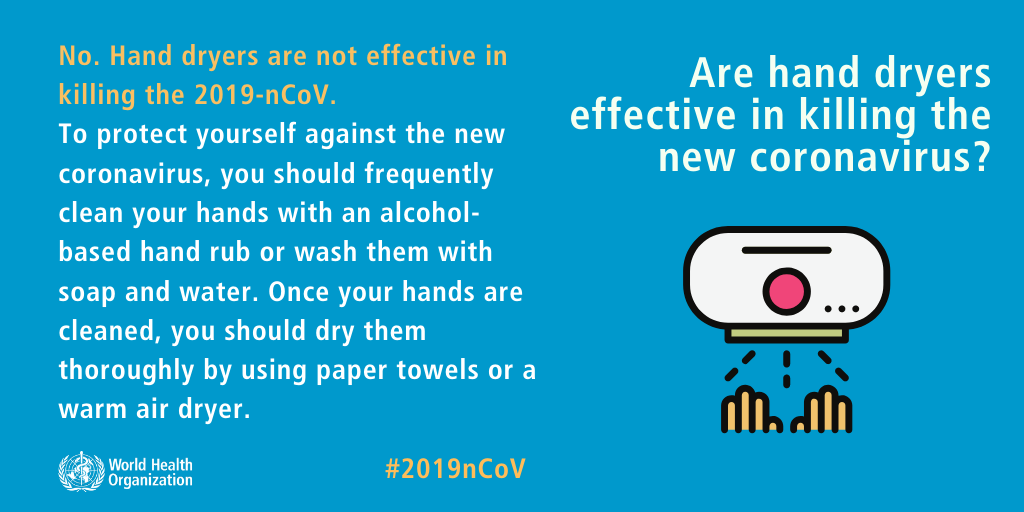
No. Hand dryers are not effective in killing the 2019-nCoV. To protect yourself against the new coronavirus, you should frequently clean your hands with an alcohol-based hand rub or wash them with soap and water. Once your hands are cleaned, you should dry them thoroughly by using paper towels or a warm air dryer.
Can an ultraviolet disinfection lamp kill the new coronavirus?
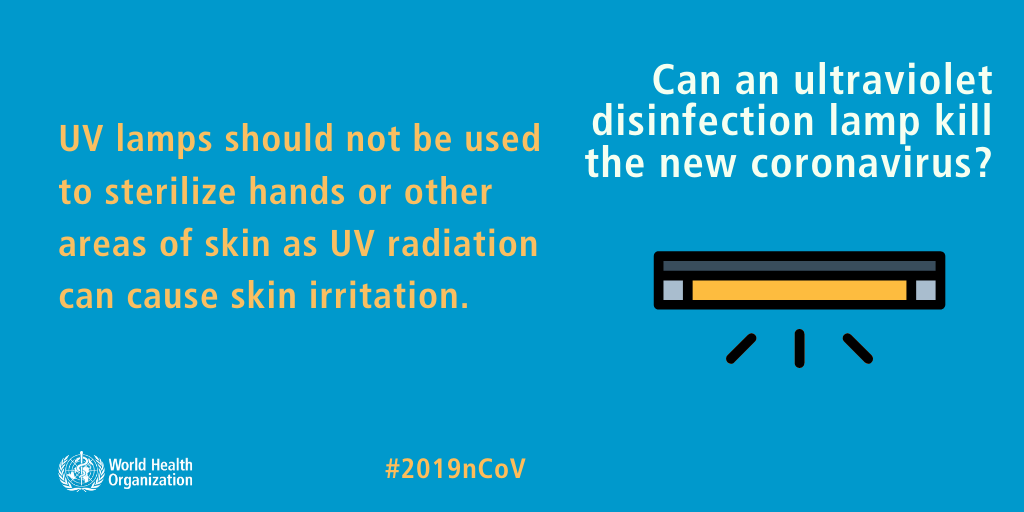
UV lamps should not be used to sterilize hands or other areas of skin as UV radiation can cause skin irritation.
How effective are thermal scanners in detecting people infected with the new coronavirus?
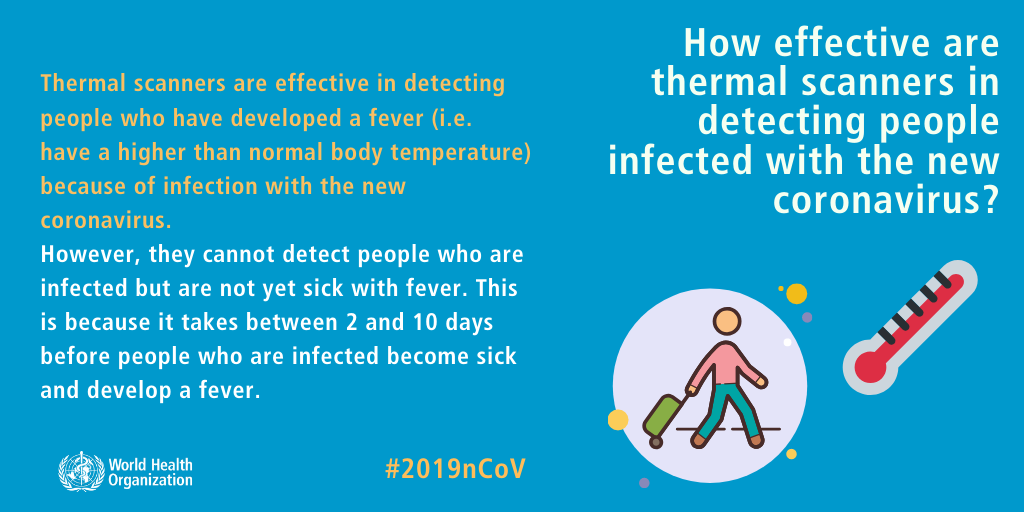
Thermal scanners are effective in detecting people who have developed a fever (i.e. have a higher than normal body temperature) because of infection with the new coronavirus.
However, they cannot detect people who are infected but are not yet sick with fever. This is because it takes between 2 and 10 days before people who are infected become sick and develop a fever.
Can spraying alcohol or chlorine all over your body kill the new coronavirus?
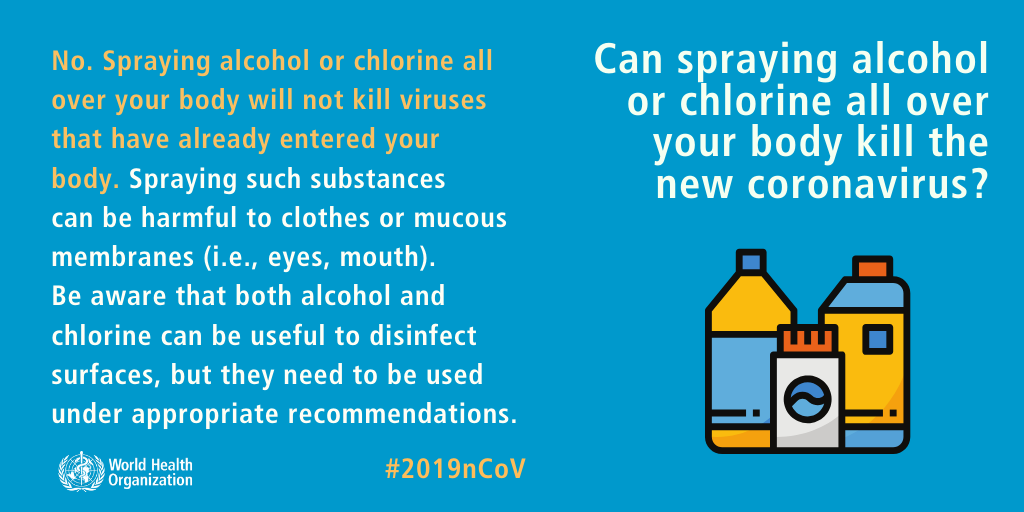
No. Spraying alcohol or chlorine all over your body will not kill viruses that have already entered your body. Spraying such substances can be harmful to clothes or mucous membranes (i.e. eyes, mouth). Be aware that both alcohol and chlorine can be useful to disinfect surfaces, but they need to be used under appropriate recommendations.
Is it safe to receive a letter or a package from China?
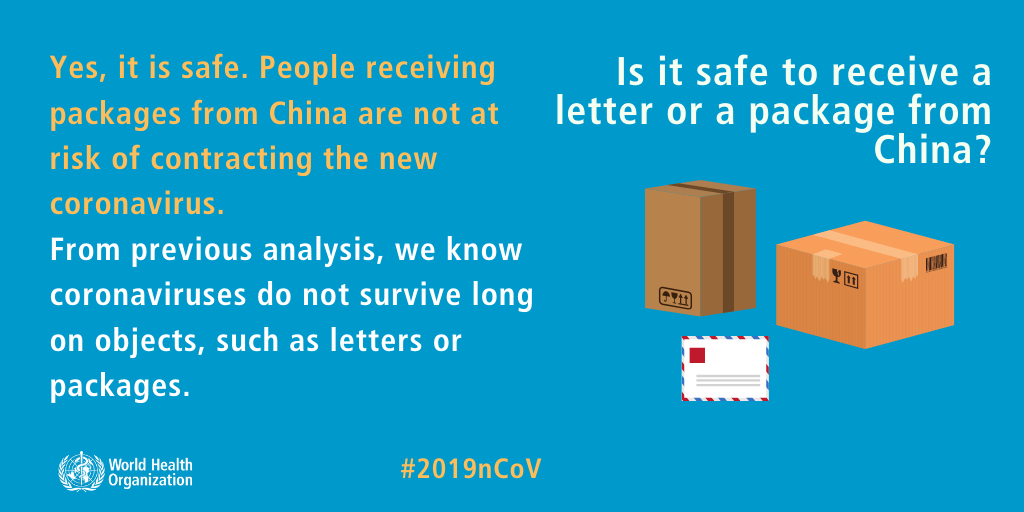
Yes, it is safe. People receiving packages from China are not at risk of contracting the new coronavirus. From previous analysis, we know coronaviruses do not survive long on objects, such as letters or packages.
Can pets at home spread the new coronavirus (2019-nCoV)?
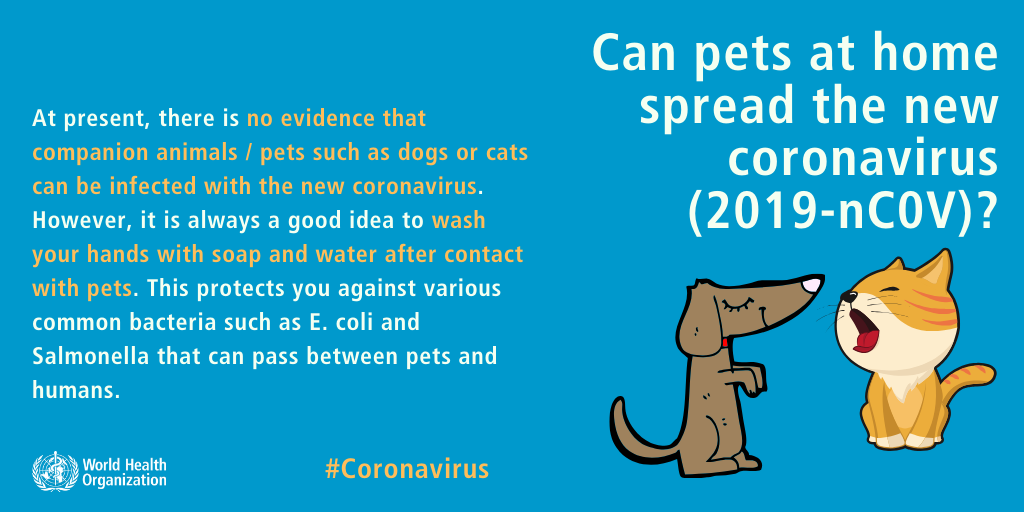
At present, there is no evidence that companion animals/pets such as dogs or cats can be infected with the new coronavirus. However, it is always a good idea to wash your hands with soap and water after contact with pets. This protects you against various common bacteria such as E.coli and Salmonella that can pass between pets and humans.
Do vaccines against pneumonia protect you against the new coronavirus?
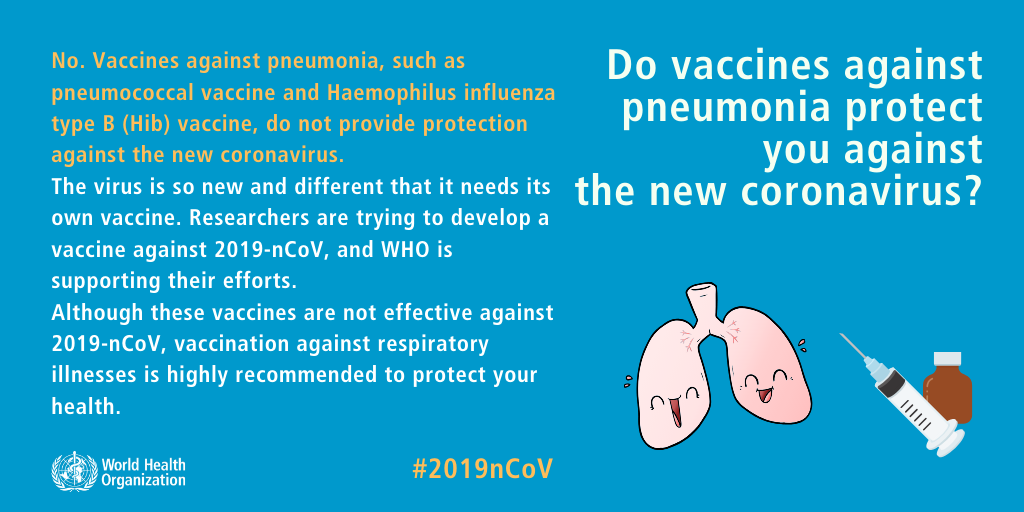
No. Vaccines against pneumonia, such as pneumococcal vaccine and Haemophilus influenza type B (Hib) vaccine, do not provide protection against the new coronavirus.
The virus is so new and different that it needs its own vaccine. Researchers are trying to develop a vaccine against 2019-nCoV, and WHO is supporting their efforts.
Although these vaccines are not effective against 2019-nCoV, vaccination against respiratory illnesses is highly recommended to protect your health.
Can regularly rinsing your nose with saline help prevent infection with the new coronavirus?
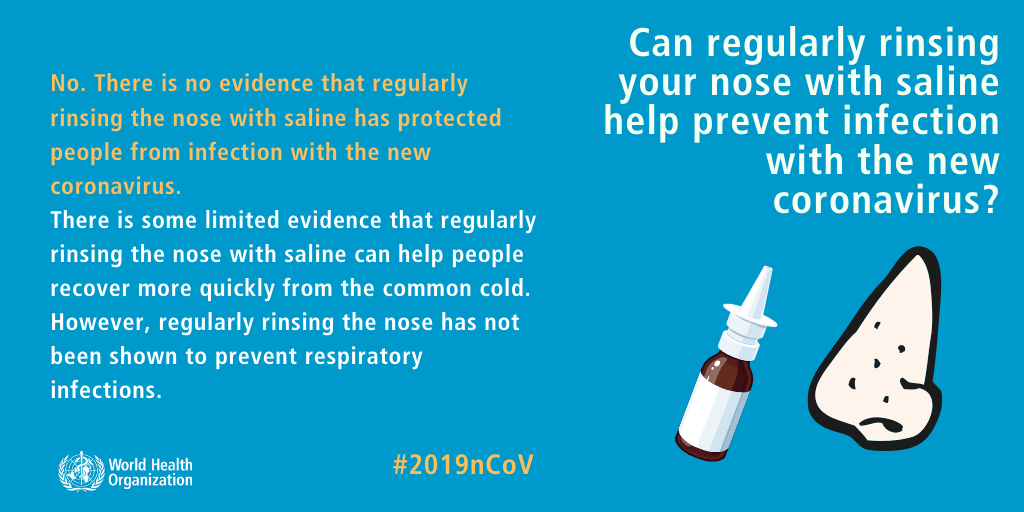
No. There is no evidence that regularly rinsing the nose with saline has protected people from infection with the new coronavirus.
There is some limited evidence that regularly rinsing nose with saline can help people recover more quickly from the common cold. However, regularly rinsing the nose has not been shown to prevent respiratory infections.
Can eating garlic help prevent infection with the new coronavirus?
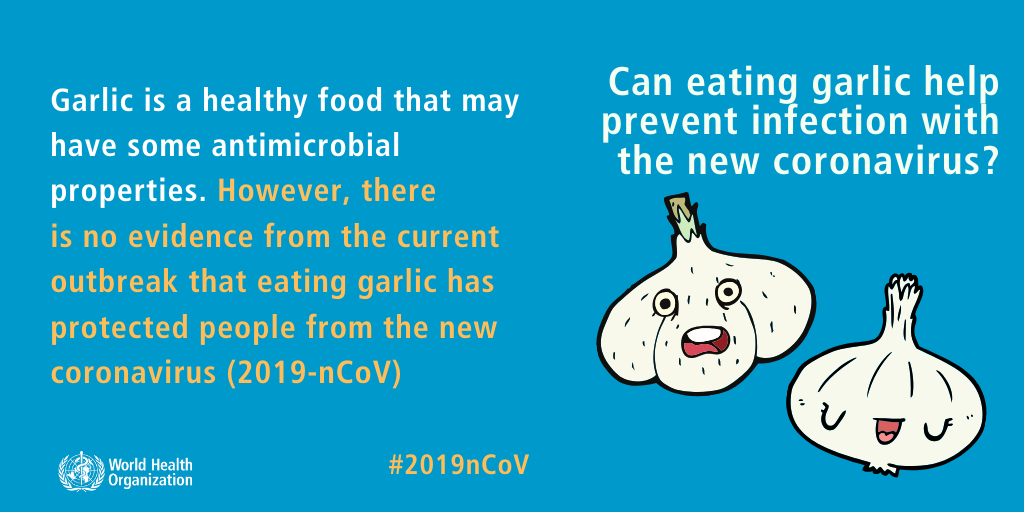
Garlic is a healthy food that may have some antimicrobial properties. However, there is no evidence from the current outbreak that eating garlic has protected people from the new coronavirus.
You can catch coronavirus eating at Chinese restaurants?
Think it like this – You have no more chance of getting infected by coronavirus, or anything else for that matter, at any Chinese restaurant, than being bitten by a giraffe in a telephone box.
Some people actually believe this. By that logic, you’d also have to avoid Italian, Korean, Japanese and Iranian restaurants, given that those countries have also been facing an outbreak.
Does putting on sesame oil block the new coronavirus from entering the body?
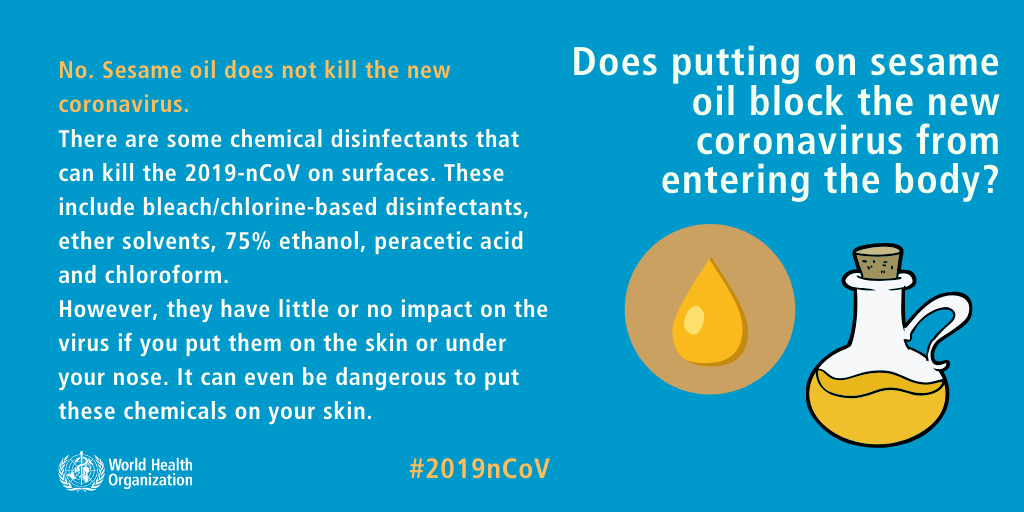
No. Sesame oil does not kill the new coronavirus. There are some chemical disinfectants that can kill the 2019-nCoV on surfaces. These include bleach/chlorine-based disinfectants, either solvents, 75% ethanol, peracetic acid and chloroform.
However, they have little or no impact on the virus if you put them on the skin or under your nose. It can even be dangerous to put these chemicals on your skin.
Does the new coronavirus affect older people, or are younger people also susceptible?
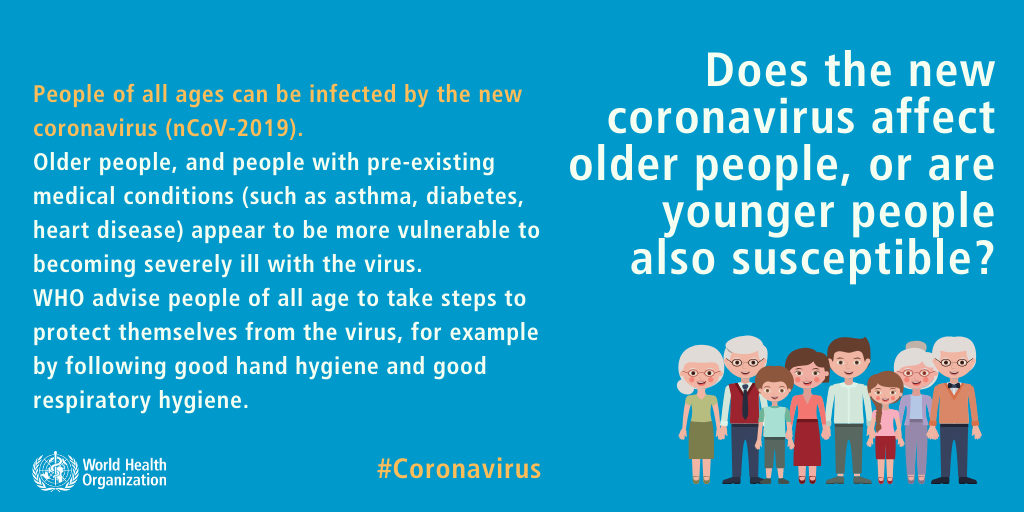
People of all ages can be infected by the new coronavirus (2019-nCoV). Older people, and people with pre-existing medical conditions (such as asthma, diabetes, heart disease) appear to be more vulnerable to becoming severely ill with the virus.
WHO advises people of all ages to take steps to protect themselves from the virus, for example by following good hand hygiene and good respiratory hygiene.
Are antibiotics effective in preventing and treating the new coronavirus?
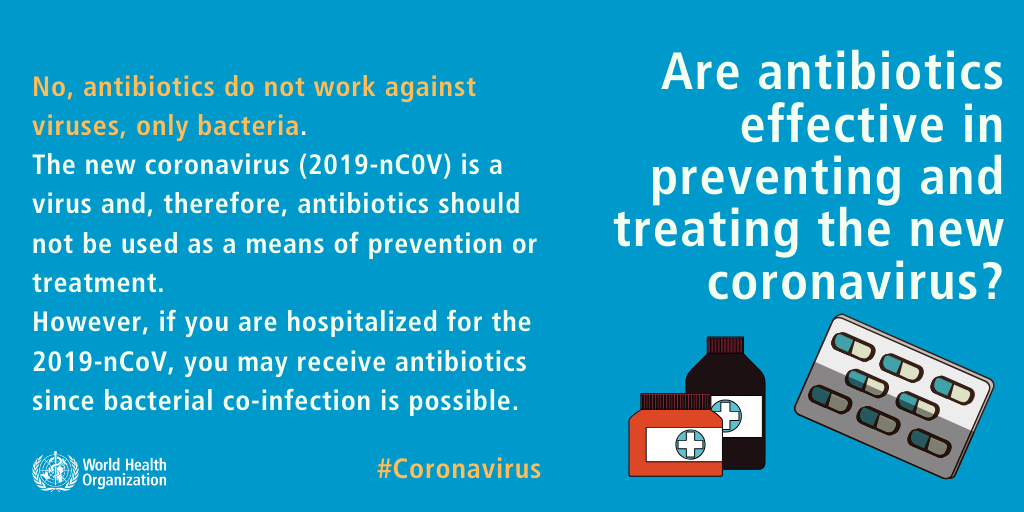
No, antibiotics do not work against viruses, only bacteria.
The new coronavirus (2019-nCoV) is a virus and, therefore, antibiotics should not be used as a means of prevention or treatment.
However, if you are hospitalized for the 2019-nCoV, you may receive antibiotics because bacterial co-infection is possible.
Are there any specific medicines to prevent or treat the new coronavirus?
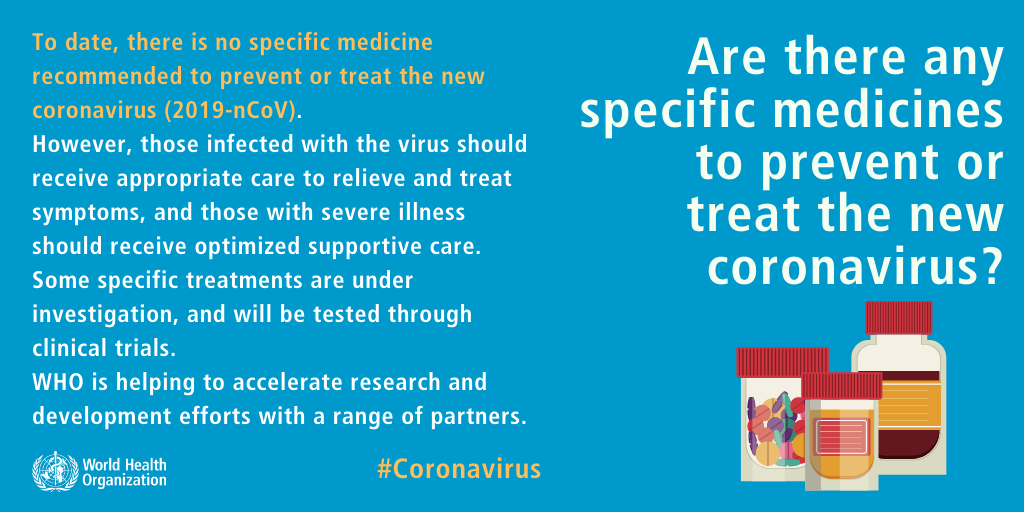
To date, there is no specific medicine recommended to prevent or treat the new coronavirus (2019-nCoV).
However, those infected with the virus should receive appropriate care to relieve and treat symptoms, and those with severe illness should receive optimized supportive care. Some specific treatments are under investigation, and will be tested through clinical trials. WHO is helping to accelerate research and development efforts with a range or partners.
Is it worse or more dangerous than a normal flu?
Many individuals who get coronavirus will experience nothing worse than normal flu symptoms – sniffling, coughing, congestion and felling of illness. But the overall profile of the disease, including its mortality rate, could end up reflecting a more serious profile.
A vaccine will be ready soon?
Several teams, separately around the globe, are now testing possible candidate vaccines in animal experiments. But the trials required before a commercial vaccine could be commercially rolled out are still at least a year away. Early human trials will also have to wait for possible side-effects and full evaluation.
Q&A on coronavirus
Reference: World Health Organization
